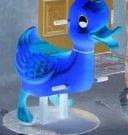All right, let's see what topic someone wants me to waste your time with this post...
"J.K., if you were a sea creature, what would you be?"
Okay, there are a million and one topics I could be asked to cover (to varying degrees of "success"), and to apply my own off beat brand of alleged humor to, and you ask me a question about animals. You ask the Bio Major who took the "Evolution of Marine Life" class this question, and expect the answer to be funny.
Well, I suppose we should be glad it's not the "Which Disney character would you sleep with" question, and we should most definitely be glad that the answer to these to questions is not the same.
What's more, this isn't the first time I've been asked this question. I've been asked it for several classes, possibly during a Mystic Theatre rehearsal, and I wouldn't be surprised if I'd been asked it in a game of Kings at some point. What's the deal? Does revealing what rare sea creature I would be reveal something deep and intricate about my soul? Is there something inherently funny about our aquatic friends? Seriously, what's the attraction?
Well, I suppose the customer is always right. Here goes. The rare sea creature I would be is--
Qwack?
No, not you Psyduck, you magnificent bastard. You don't count. You're not real.
Qwaaaaaaaaaaack.
I know it's not fair. I'll make it up to you later, okay?
Qwack.
So, right. I'd put something here to make fun of that little break from reality, but I feel like I took all the challenge right out from it. Moving right along, what sea creature would I be? Get out your pillows and blankets, folks, this could get downright painful.
Most of you probably wouldn't be surprised to hear of my fondness for Phylum Mollusca. These include classes such as gastropoda (snails and slugs), bivalvia (oysters, clams, mussels, scallops and the like), and cephalopoda (squids, octopi, and cuttlefish). The primary characteristic that unites these diverse species into an identifiable taxonomic group is the fleshy mantle, that big empty fleshy part used for respiration (and depending on the particular mollusc, locomotion or feeding).
In particular, I like the cephalopods, your tentacley kraken of the deep. For starters, as a group they possess a complex nervous system and a great deal of intelligence (in test octopi, they've been shown to have fairly advanced problem solving capabilities). Their eyesight is, at the very least, comparable to our own, if not better due to the way the optic nerve innervates they retina. And, lest we forget, some of our favorite Eldritch Abominations appear to have a cephalopod for a face.
But what cephalopod in particular would I pick? Probably something from the genus Sepia, better known to you as the cuttlefish.
"But Lantern, cuttlefish are relatively small and unthreatening compared to the the Giant Squid or that Octopus we watched break a shark in half on National Geographic!"
Yes, I am well aware of that. However, the malleability of their bodies is nearly unparalleled, even among their fellow cephalopods. Additionally, their tri-compartment (rather than dual-compartment) and nerve controlled (rather than hormonally controlled) chromatophores allow for exceedingly rapid and complex changes in color. Add in some iridiphores that can be manipulated to reflect varying wavelengths of light, and you have perhaps the greatest system for crypsis in existence. The cuttlefish is capable of manipulating a wide variety of strata, both natural and man-made, and furthermore, when a particular region of their body is chemically "frozen" in one color, they are able to shift the rest of their coloration to compensate without having to see themselves: they can tell that something isn't working right.
But this advanced ability to morph their shape and color is not a unitasker. Some studies seem to indicate that their ability to manipulate the wavelengths of light they reflect is not just used to hide, but perhaps to communicate with other members of their species. Think of it: an elegant, simple form of non-verbal language that, with the proper use, doesn't give your position away to things which look at you as the next item on the menu.
Man, this is supremely unfunny, and all too educational. You were expecting me to pick something weird because it's slimy, tentacly, or just supremely badass, weren't you? Well, okay. I've got one.
Conus.
It's a sea snail. That fires poisonous harpoons. And eats fish.
Don't believe me? Here you go! Instant Nightmare Fuel Unleaded! Screw you Nemo! WOOOOOOOOOOOO!
...I'm going to Hell now, aren't I?
-J.K. Lantern
Saturday, March 20, 2010
Subscribe to:
Post Comments (Atom)

Yes, you're going to Hell. But pinpointing the exact cause is like pointing at a specific grain of sand and berating it for getting the edge of the water all dirty. Best to go with the flow.
ReplyDeleteMy favorite marine animal is My Friend The Stickleback, which has a neat little evolutionary story or two. Said story does not involve helicopters or cannibals (to the best of my knowledge) but it's neat nonetheless.